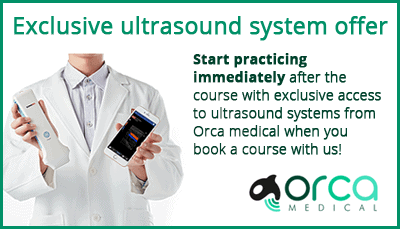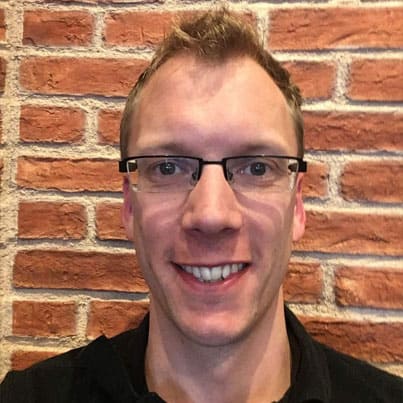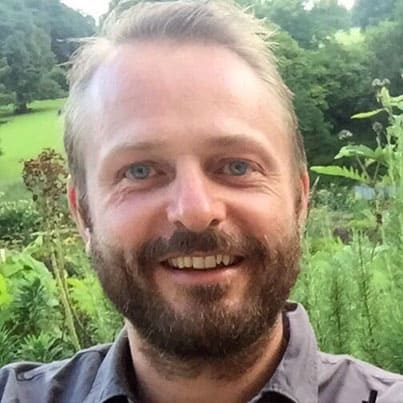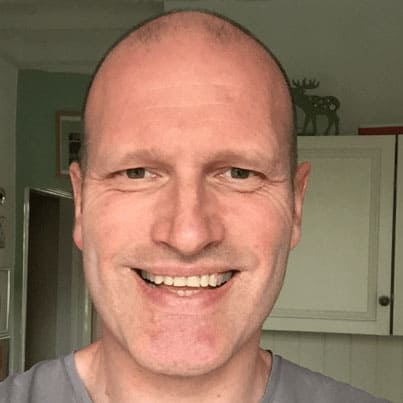About this Introduction to ultrasound guided injections course
A fantastic starting point for those wishing to explore developing skills in performing ultrasound guided musculoskeletal injections. The course will be run by highly experienced Physiotherapists, who have been utilising ultrasound guided injections within their practice for many years within point of care settings and Radiology services. The teaching team will consist of those who teach on our cadaveric injection course and the ultrasound guided injection therapy module run in partnership with Brunel University London
The course will contain an overview of injections for both upper and lower limb conditions. Attention to probe handling, needle proprioception and clinician positioning. We will utilise unique phantom devices to enhance learning and practice real-time needle visualisation on high quality systems.
The Introduction to MSK ultrasound guided injections course takes place at the Mary Seacole Building, Brunel University London, 8 Kingston Ln, Uxbridge UB8 3PN View Location Maps
Who is this course suitable for?
This course is suitable for allied health or medical professionals who:
- Have significant experiences of assessing and treating patients with MSK disorders.
- Have some prior experience of MSK ultrasonography – for example an introductory musculoskeletal ultrasound course. For more information on why we feel its important to have experience of diagnostic skills prior to considering performing ultrasound guided injections, see our recent blog post here.
- Have prior experience of soft tissue and joint injection therapy – if working as an allied health professional in the UK we advise you to have completed an injection therapy course first. You can find a list of those here.
- Are employed in a professional environment that enables you to utilise this within your practice
- Have a recognised professional medical qualification and current registration with a relevant UK professional body eg HCPC or GMC, or foreign equivalent if travelling from abroad.
This course provides 14 CPD credits (Day 1 = 7 credits, Day 2 = 7 credits) in accordance with the CPD Scheme of the Royal College of Radiologists
Our CPD courses provide education but do not award a certificate of competency. You must enquire with your relevant professional body to confirm if the skills covered within our courses are considered within the scope of your professional practice, and whether your professional insurance will cover you to use them in your practice. Ultrasound regulation is a complex issue. Any skills covered by the course should be maintained and developed through ongoing mentorship, peer support, and training. Please get in touch if you have questions here.
Course outline
| Time | Activity |
|---|---|
| 08.45 – 09:00 | Role of ultrasound guided injections in neuromusculoskeletal pain Establishing and maintaining competencies and continued professional development Practice guidelines Medicolegal Health and Safety |
| 09:00 – 09:15 Presentation & Discussion | Main principles of practice Benefits for ultrasound over surface marked injections Evidence for increased efficacy of ultrasound guided injections Scope of injection and needling techniques used with ultrasound guidance Injectable substances – theory and evidence for their effectiveness |
| 09:15 – 9.30 | Aseptic technique and considerations to the guided injection procedure |
| 9.30 - 10.30 | Practical Injection technique – physics relating to needle image optimisation and utilising phantom devices to practice seeing the needle. |
| 10:30 - 10:45 | Coffee break |
| 10:45-12:30 Practical Session I | Lower Limb techniques including demonstration Facilitated small group session: Knee Intra-articular knee approaches and aspirations. |
| 12:45 – 13:15 | Lunch |
| 13:15 – 14:15 Practical Session II | Lower Limb techniques including demonstration Facilitated small group session: Ankle & Foot Intra-articular, plantar fascia, mortons neuroma, first MTP joint, tib post/peroneal sheaths. |
| 14:15 – 15.00 Practical Session III | Lower Limb techniques including demonstration Facilitated small group session: Hip joint and gluteal tendinopathy/trochanteric bursa. |
| 15:00 - 15:15 | Coffee break |
| 15.15 – 15:45 Practical Session IV | Upper limb techniques including demonstration Facilitated small group session: Shoulder : Sub-acromial, Intra-articular, AC joint, |
| 15:45 - 16:30 Practical Session V | Upper limb techniques including demonstration Facilitated small group session: Radio-carpal joint, De Quervains tenosynovitis, Carpal tunnel syndrome. 1st CMC joint, trigger finger, tennis elbow. |
| 16:30 | Finish |
EXTRA ONLINE LECTURES AND TUTORIAL VIDEOS
NEEDLE VISUALISATION TUTORIALS ONLINE 24/7
All course delegates who attend our ultrasound guided injection training will get unlimited access to five tutorials on basic needle skills, like the one to the right. These will provide an excellent source of information for you to review during your learning and before the course.
- Part 1: Needle Insertion Point
- Part 2: Bevel position
- Part 3: Cross cut artefact
- Part 4: Toe in the probe
- Part 5: Angle of needle entry

ONLINE LECTURES 24/7
All course delegates who attend our ultrasound guided injection training will get unlimited access to five online lectures by our course tutors. These provide a more in-depth appreciation of the topics outlined below. We are constantly adding to this selection, so keep your eyes peeled!
- Needle visualisation
- Aseptic technique
- Informed consent
- Ultrasound guided injections and the evidence base
- Why we use cadaveric specimens for our guided injection training
GAIN ACCESS TO OUR PRIVATE FACEBOOK MSK ULTRASOUND COMMUNITY OF PRACTICE
By attending our courses you will also gain access to your tutors in our private, Facebook community of MSK Ultrasound practice with specific groups for upper and lower limb MSK Ultrasound pathology, discussing anonymised cases and articles of interest. We also have groups for upper and lower limb guided injection techniques, discuss your techniques – what went well, what could be improved and what the evidence is. Lastly, but importantly we have established groups on training and governance.

Course Dates & Booking
Course prices shown are inclusive of VAT
If your attendance on the course is to be funded by your trust or you have any other queries then please contact us.
| Date | Places | Price | |
|---|---|---|---|
| Date | Places | Price |


Course location
Your Course Tutors
(We reserve the right to alter the exact teaching team for events, if you have specific requirements please email us at [email protected])

Mr Stuart Wildman
MSc, BSc (Hons) Physiotherapy, HCPC, MCSP, PG Cert/CASE accredited Musculoskeletal Sonography, PG Dip injection therapy
Stuart is an Extended Scope Physiotherapist and MSK Sonographer working in the NHS in London. He has an interesting working week, dividing his time between Radiology and Physiotherapy, here he performs both diagnostic and guided interventions in both. He qualified from the University of Southampton in 2003 with a BSc Physiotherapy, and went on to gain an MSc in Advanced Neuromusculoskeletal Physiotherapy at The University of Hertfordshire and a PG Cert in MSK Sonography at Canterbury and Christ Church University.

Mr David Baker
BSc Physiotherapy HCPC, MCSP, PG Cert Musculoskeletal Sonography
David brings together his unique skills as ESP, MSK Sonographer, experienced injection therapist, and lecturer to the website. David works as an Extended Scope Physiotherapist in the NHS, working extensively with diagnostic ultrasound since 2007 and studied for his formal Pg Cert at Canterbury Christ Church University. He has further developed his special interest in ultrasound guided injection therapy.

Mr Robert Mast
BSc Physiotherapy HCPC, MCSP, PgCert Musculoskeletal Sonography, Non Medical prescriber
Rob trained and qualified as a physiotherapist through the HvA in Amsterdam in 1993.
He has been working for Homerton University Hospital as an Extended Scope Physiotherapist in the primary care setting since 2004. He works one day per week in the Radiology Department of Homerton University Hospital as an MSK sonographer both for diagnostics as well as for carrying out interventional procedures.
What our attendees say about our introduction to ultrasound guided injections course?
”I was very impressed with the one day MSK ultrasound guided injection course run by The Ultrasound Site. Teaching ultrasound guided injections to clinicians from a wide variety of specialities and experiences on a single day is no easy task. The tutors were knowledgable, enthusiastic and extremely well prepared. Their passion for the use of ultrasound was impressive and I expect this one day course to continue to evolve and get even better.”
Keep up the good work Stuart, Rob and Dave!’
”Really interesting and practical course for radiologists, Orthopaedic surgeons, rheumatologists and GPs.
It practically covers all aspects of joint injections, with tips and tricks to manage the most frequent muscolo-skeletal disorders.
Well organized and easily reachable from the city center or the airport for participants coming from abroad. To be recommended”
FAQs
Q. How do I know that this course is of high quality?
All the lecturers on our courses have completed formal training MSK Sonography and have been using MSK Ultrasound for several years. Crucially, they are clinicians with many years experience of integrating ultrasound into their practice alongside other forms of imaging such as MRI giving a great breadth of experience to enable them to teach ultrasound in the correct clinical context.
Several teach on PG Cert MSK Ultrasound University based courses as guest lecturers, and present at different events each year. The lecturers are also members of executive committees of professional organisations such as the Chartered Society of Physiotherapy, The Royal College of Radiologists and British Association of Sports and Exercise Medicine, so are very familiar with MSK ultrasound and injection therapy development within different professional roles.
Q. Do we get to use the ultrasound machines?
We know the importance of hands-on practice when scanning! As we’ve been there when we were learning! So we can reply with a massive YES! The course is designed with high lecturer:student ratios, with on average a lecturer for every 5 students. We have a large number of machines to ensure that as much time as possible is spent with the students scanning under close supervision. We understand the subtlety of moving a probe to ensure you achieve a high quality diagnostic image. We try to provide a selection of machines including hand held mobile devices, laptop systems and cart based – this gives you the ideal opportunity to trial systems and work out what might suitable for you.
Q. Does this qualify me as a sonographer?
Surprisingly, a sonographer is not a protected title and therefore anyone can theoretically call themselves a ‘sonographer’. I guess a better way to pose this question would be ‘does this deem me competent to perform ultrasound in the setting I wish to use it in?’. Well, this depends on the setting and the local governance but essentially this course is designed as an important first step for people who are considering an ultrasound qualification, or who are interested in learning ultrasound to give them an idea of how ultrasound may fit into their practice. The course can also serve as a refresher, perhaps for certain joints.
To undertake a formal qualification which would lead you to be able to work in for example Radiology departments within the NHS you would need to progress on to complete a PG Cert qualification on a CASE accredited course. This course would place you in a strong position before starting your CASE course. We are creating a University accredited CASE course at the moment and hope to release news in early 2018!
Q. How do I know if I am scanning things correctly?
Because we have a large ratio of lecturers to students, there will be someone overseeing and teaching with each group for as much time as possible throughout the day to ensure that you are handling the probe correctly and there are lots of tips on image optimisatio and use of the machine technology to get the best image! Basically, we will be peering over your shoulder! After the course you can also join us on our Medshr group, to keep touch and share images for feedback and as a record of your ongoing learning.
Q. What are the advantages of doing this course?
The advantages of doing this course is that all of the tutors have extensive experience of working with ultrasound and ultrasound guided injections working within busy Radiology, NHS , Private and Sports injuries clinics..we have it all covered! Most importantly, we are enthusiastic and passionate about teaching..that is why we set this up in our spare time!
Q. What are the terms and conditions for refunds and bookings?
All details for the refund policy and bookings terms and conditions can be found HERE
Q. Do I need to have scanned before in order to attend a course?
For our Introductory MSK Ultrasound course..No. We have many people who attend the course who have little, or no, previous scanning experience. This course is designed to accommodate people who have no previous scanning experience and are interested in learning from scratch. However, as mentioned above, it is also a very useful learning experience for people with some scanning background as well.
For our injection courses it is best to have attended the Introductory course first. Have a read of this blog as well to gain some more ideas on why developing your diagnostic skills first is a good idea.
Q. Do you provide training to whole departments?
We are able to travel and provide a customised training program for a group of clinicians in a department. For further discussion email us at [email protected]
Q. Does this course qualify me to perform ultrasound guided injections in my workplace?
No. In order to perform image guided injections in your workplace you must conform to local guidelines and competency requirements. This course, however, may form part of your CPD and learning if you are looking to start performing ultrasound guided injections, or as a top-up course as part of your continuing CPD.